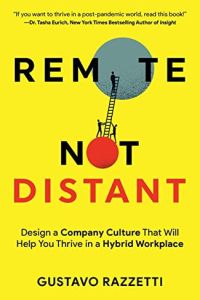Join getAbstract to access the summary!

Join getAbstract to access the summary!
Gustavo Razzetti
Remote Not Distant
Design a Company Culture That Will Help You Thrive in a Hybrid Workplace
Gustavo Razzetti, 2022
What's inside?
Leaders must accept that the hybrid workspacehas become a permanent feature of life.
Recommendation
Leaders must accept that hybrid work is now a permanent situation – and use it to their company’s advantage. Consultant Gustavo Razzetti spells out what executives must do to gain the maximum advantage from a hybrid workforce. Some corporate leaders initially believed people would return to in-office work, resuming their pre-pandemic routines. These bosses didn’t understand how COVID changed their employees’ view of work. Before the pandemic, about 25% of employed Americans worked from home at least part of the time. Despite that, remote work had a negative connotation. Now, results prove that remote work boosts productivity, and the nature of work has changed. Razzetti explains how to make the most of this new world.
Summary
About the Author
Gustavo Razzetti is CEO of Fearless Culture, a workplace culture consulting firm.






















Comment on this summary